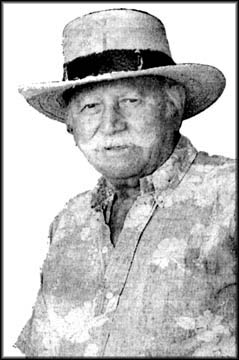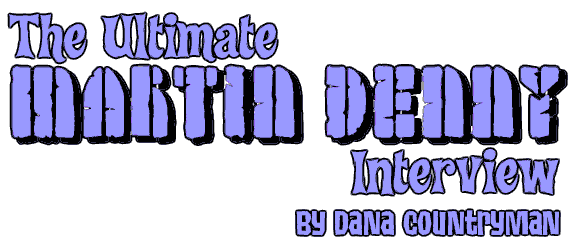
Author's Note: I interviewed Martin Denny, on July 4th, 1997, at the height of the reinterest in "Exotica". The interview was published in my magazine, COOL AND STRANGE MUSIC MAGAZINE, with Mr. Denny gracing the cover. (That issue was sold out long ago...) I found him to be a talkative fellow, who at that time was 86 years old. After our interview, I promised to send him a transcript of it to his home in Hawaii, before it was published. Upon receiving it, he phoned me, insisting on making changes in the way he spoke in the piece. I remember he particularly didn't want to see any mention of the word "Well", at the beginning of his sentences (!) He also wanted to remove his mentions
of his admission that many of his later albums were "ghosted"
by other pianists and musicians. But former bandmate Julius Wechter
had spilled the beans about that fact in a previous issue of my
magazine, so Denny had to fess up. It was the first time he'd
ever spoken of the ghosting in an interview. I was also very happy that he came clean about the fact that he didn't play a note on the "Exotic Moog" album -- something I'd suspected for a while. (Clark Gassman played the Moog, as he did on the excellent "Ralph Carmichael Presents THE ELECTRIC SYMPHONY - probably only only Christian Moog album ever!) So, this interview was somewhat of a painful experience, with Denny phoning me a total of three times to dictate changes he wanted. At least one great story was chopped out of the piece -- an anecdote about touring with Betty Hutton. Unfortunately, I seem to have removed that story from the original text, and it's been lost, but if I locate it, I'll add it in here at some future date. There also wasn't enough room to run the entire interview, because of space constraints, so a lot of it was edited out by me. Of course, I was grateful for the interview, and it was a big honor to have spoken with him. I'm a fan, and I have a lot of respect for Mr. Denny, but I always told myself that when he has left this mortal coil, that I'd publish the entire 27,000 word interview. So, here it is....
Dana Countryman: Thanks for doing this
interview with us, Mr. Denny. I'd like to talk about a few of
the things that really haven't come up in past interviews that
you've done. DC: I know that in your early years you
toured around in South America. Can you tell me about that? They told us that if we could keep working down there (South America), well, we should. So we freelanced our way down the West Coast, going down to Lima, Peru and Santiago, Chile and eventually to Buenos Aires, Argentina. We spent 3 1/2 years there. DC: What kind of music did you play there
at that time? DC: So you played mainly the music from
the U.S.A.? DC: That must have been some of the early
South American/Latin influence for your own music. DC: I understand that you were somewhat
of a child prodigy. So some of my experiences down there (in
South America) were highlights. One was being involved in a revolution
in Chile while we were there, by coincindence. A revolution broke
out on June 7th, 1932 and I spent my 21st birthday in Lima, Peru. So, here we are in Santiago, Chile and the President had absconded. There were mob scenes and people were all up in arms. It was pretty grim. We had to leave the country because there was complete chaos. So we were able to book passage on the first plane trip I ever made. It was a Ford Tri-Motor and we had to go over the Andes at a height of over 16,500 feet. We had to breathe through oxygen tubes in those days. This particular plane was called a "San Jose" and it was later lost in the mountains, and wasn't recovered until a year later. But when we got to Buenos Aires, we didn't have any bookings. When we arrived, we checked into this hotel. We were one of the first ones to bring news of the revolution, because all the wires had been cut off. We were interviewed by newspaper reporters who came up to our room. One of the boys in the band, his name was Noble Dunn Montero. Now "Montero" also happened to be the name of the absconding Chilean president. And so we read the headlines in the paper that an American orchestra was traveling incognito with the deposed president's son! DC: Obviously, that wasn't true! So then, as a gag, we flew over Buenos Aires on this plane with our instruments, and the pilots turned off the engine. So as we glided silently, we played "Fight On For Old S.C." over the two loudspeakers that were attached to the wings! DC: The people on the ground must have
wondered what was going on! DC: So is that when you started playing
more Latin-influenced music? DC: Was that under your own name? DC: And you came out of what state? DC: Did you keep in touch with them over
the years? DC: Who were some of the musical artists
that you admired at that time? DC: He was gigantic! DC: Russ Columbo? We also played for the American ambassador, there was a lot of society that we were exposed to then. We opened up another nightclub called "The Whoopie", it was down in the basement of a building, and we were able to draw a lot of people from society. And we packed the place nightly, and then from there we did a tour through the south of the Argentines. DC: So you really covered a lot of ground. DC: Were all of these bookings placed
through an agency? DC: What year did you come back to the
States, then? But Dean passed away quite a number of years ago. But I would say that touring in South America had a very powerful influence in my life. DC: What kind of music did you play between
the years that you returned to American and when you started recording
for Liberty? An engagement that he had for us to go to Honolulu fell through. Giggy asked me if I wanted to stay with him, because he was going to reform the group in Honolulu. But being that I had just come back from South America, I didn't want to get lost again for another 4 1/2 years. As far as I was concerned, Hawaii was just a place on a map, you know. Just a place that had hula girls and palm trees. DC: So you stayed in Los Angeles? DC: Any name bands? DC: Yes, I wanted to ask you about that.
I'm a big Betty Hutton fan. DC: Was this just solo piano?
Well, I was playing at this little place in Eureka with a trio and I wasn't too happy about it. And so this was very exciting to me. So I was destined to go to Hawaii. So I started at Don The Beachcombers in the first part of January. DC: Solo, again? So I got more serious about what I was going to do with my life. When I was in Las Vegas, I played with various bands in showrooms. The band would play on the night off for the local hotel bands and we'd back all the different acts. So I'd been advised by good friends of mine to come back to Hawaii. Oh, I loved Honolulu, playing at a place right on the beach at Waikiki! DC: No, you can't argue with that! So they agreed, and I decided to come back.
So I alternated playing the cocktail hour at the Royal, then I'd
run across the street with the group and play. At the time I organized
the group, I got two musicians, Arthur Lyman, who at that point
was about 21 years old and was working as a desk clerk at the
Hailakalani Hotel. The other was John Kramer, who worked for the Territory in the accounting department, and he played bass. And that was my first group, we were a trio. I didn't have any set formula, so I bought a bunch of folio books of George Shearing. We played arrangements like "September In The Rain", "Roses Of Picardy", all of his tunes. We sounded more George Shearing than George! DC: Now, would you consider him an early
influence? It seems like your piano style is particularly chord
clusters in the Shearing style. DC: How long after this was it that you
added your percussionist? So I was offered a job by Alfred, who at this time was performing at Henry J. Kaiser's Hawaiian Village. So Kaiser's people came down and listened to the group, and liked it very much. We were playing more of less straight jazz. So I agreed to go with him, but just before we left, a fellow came up to us from the audience and asked if he could sit in with us and play bongos. His name was Augie Colon (pronounced "Cologne"), and Augie must have been about 22 or 23 years old. He was a good-looking Puerto Rican boy, and he played up a storm with me. We played some Latin things, and he got a tremendous hand. I would invite him to come up anytime he wanted to sit in with the group, so he would show up every evening! It really enhanced the group, because we didn't have a regular drummer. Lyman would play stand-up drums occasionally. So, through my influence I was able to get Augie a job to stay on and play with the group that followed me, that I had recommended to Don. We parted good friends, and I told him that I would help him replace my group, when I left.
DC: Was that about the time that you
started taking American standards and making them more tropical
sounding? The music became a quasi-mix of music from the South Pacific, the Orient and South America. We were always experimenting, and trying out new ideas. Of course, that's when we added the birdcalls on "Quiet Village". There was such a tremendous call for it. I kept getting repeat requests for it, I mean, during the course of an evening I had to play that damn thing maybe a dozen times! DC: So I guess you'd consider that a
major turning point for your career.
DC: So more and more people started coming
to your shows. DC: When did you start dressing in the
Hawaiian shirts? I notice in a lot of the pictures, you're wearing
them. They would bring me back instruments, and I would work up little arrangements around them. I realized that the crowd we were playing for was a real melting pot. So I would cater to the tastes of the people who came in who were Filipino, Portuguese, Puerto Rican, you name it. We had a great following in the military, and we cultivated many friends. DC: Now, how did Liberty Record discover
you? So they heard the group and approached me. Arnold Mills was the associate manager, and he managed me. I signed a contract with him that included an arrangement with Liberty Records. DC: Oh, they had a connection with Liberty
Records! DC: When you first signed, did Liberty
seem enthusiastic about the group? And so in late 1956 I recorded at the late
Webley Edwards' studios. He was the only one at that time that
had Hi-Fi studio equipment. So in October of 1956 we did the entire
album in one session. All I had was an allowance of $850 to do
it. I was 20 minutes short and I had to beg the engineer, Bob
Lang to go overtime for us. When the album was released it sold
400,000 LPs at the suggested price of $4.95. Henry J. Kaiser was very upset about my leaving, because I had been doing so well at the Shell Bar. We had been cramming the place every night. So he really put the pressure on me, he didn't want me to leave. But it was one of the most important decisions I every had to make in my life. I was giving up so-called security. He tried everything he could do to break up my group. Eventually, he did get two members. He got Arthur Lyman, who was my vibe man. DC: I wanted to ask you about that. How
did you feel when Lyman left? That must have been a major blow. DC: That seems pretty obvious, listening
to his recordings. DC: It seems like all of a sudden he
was becoming your competition, in some ways.
Then I got a letter from Julius, who was only 2 years out of high school and was working for Lockheed or someplace as a timekeeper. He sent me a nice letter that said if I hired him, he promised that he'd be a great asset to me. It was a very nice letter. So I said "okay", and so I hired him. He came to Hawaii with his wife and little boy. I thought he was a great asset, he had tremendous ability. DC: He did some arranging for you, didn't
he? DC: Right, he became a major West Coast
session player. DC: I wanted to ask you about that. When
we interviewed Mr. Wechter, he made some comments that you might
have stopped playing on some of the albums and that they had been
recorded by other musicians. DC: And that started in the '60s? DC: Do you recall what album the ghosting
might have started with? DC: How involved were you in the "Exotic
Moog" album? DC: Well, I really appreciate you sharing
the honest truth with us. A lot of your fans have expressed interest
in learning more about that particular period of your career.
You know, that "Exotic Moog" albums is considered one
of the most highly collectable Martin Denny albums. DC: Now, once this ghosting began, did
you still have a hand in recording, or were you pretty tied up
with touring? You've got to remember, it wasn't vocal - it was purely instrumental. What they did was use my name, and try and come up with an approach that approximated my playing. DC: And then you still received your
normal royalties on those records? DC: You know, I have some of those records,
and they just don't hold the same interest for me. You associate
the Martin Denny sound with the melodic, tropical tunes, not so
much with the freeform jazz stuff that the ghosted albums became
later.
DC: They've done an excellent job on
all of those. \No, but what I said in the liner notes is absolutely true. You know, one thing I've always said...I never took credit for my musicians. All I did was direct their talent into my style. DC: That's a very generous thing to do.
I know a lot of leaders who have had a hard time letting their
coworkers have much creative output. For example, to let Julius
Wechter have a hand in writing and arranging, that shows a lot
of graciousness and trust on your part. You know, when he left the group he formed
the Baja Marimba Band later on, after the Tijuana Brass Band became
successful. He depicted this band like the stereotype a lot of
people think Mexicans are; lazy, shiftless, and went out there
as bearded scalawags. That was the premise of his appearances, but they were a direct takeoff of the Tijuana Brass. And then, him wanting to do a song that came from "Deep Throat"! I mean, why?!! DC: Maybe it would have been one of the
bad business moves of all time, but it never did happen so I guess
that says a lot. It was kind of hard, but he did it. And I'm glad for his success, very happy about it. And I had some other talented people in the group. One of them just passed away recently, that was Hagood Hardy. I don't know if you know him. DC: Sure, he recorded "The Homecoming". DC: He was Canadian, wasn't he? DC: And he played vibes, too? And I got a letter recently from his wife. She sent me two CDs that he recorded before he died. I also had a number of other replacements. But anyway, I had a very interesting career... DC: Now, this kind of brings me up to
modern times. I know that you did the interview with the Incredibly
Strange Music book in 1993. DC: That must have been, from my perspective,
the start of this whole resurgence of your popularity. DC: You must have been shocked by the
sudden reinterest after all the years that you did your recordings.
Were you surprised by all the new interest?
DC: Was this the Japanese company? But after they got what they wanted, they just stonewalled me, completely. They've never sent me a yearly statement, nothing. All I received was a deep apology, and then when I tried to follow it up, there was no answer. So, it was very strange. But if they want to release it in this country, that's another bag. DC: Let me ask you, what artists do you
currently listen to? Are there any artist that are putting our
modern music that you admire? DC: Do you have a lot of records in your
own collection? DC: Do you have any complete collections
of any specific artist? For example, you mentioned Louis Armstrong... DC: Dave Brubeck? DC: Do you still get out and perform?
I know you're somewhat retired now. DC: That's great! Well, I just have a
couple more questions for you here. I know that Les Baxter's music
was a big influence on your transformation into the early tropical
stuff. DC: Do you have any remembrances of Les
Baxter? People always associated it with me, as being the writer, which I denied vehemently. I always gave him credit for everything he ever did. At first, he denigrated the bird calls, but later on I got a request from him, asking if I would send him a tape of birdcalls! But he was a friend, he was a guest in my home. I had an amiable relationship with him. DC: Yet you never recorded with him? Of course, the one that I treasure most is James A. Michner. He was pretty sincere. There was also Ferde Grofe, Sturgess, Louella Parsons, Walter Winchell, people like that.
DC: You know, there's practically a fan
club, springing up over the covers that she did for your records. DC: I guess it helped! DC: So you don't know if she's still
alive, or anything like that. DC: I'm sure she is!
DC: Are you currently working on anything
else, musically? DC: One last question, I have a recording
of a demo by a new group called Don Tiki. Tell me how you came
to record with them. DC: It sounds great, kind of updated
for the '90s. DC: What I've heard sounds really excellent. DC: That would be kind of like going
back to the beginning, how you started. DC: Well, that would be great! We'd love
to hear some more Martin Denny music! DC: Great. Well, thanks for chatting
with us. I appreciate your giving us this interview. I know people
will be interested to hear what you have to say. *****
Author's Note: Special thanks to Ashley Warren of Scamp Records for many of the photos used in this article, and to the late, great Mr. Denny for graciously supplying photos from his personal collection. |
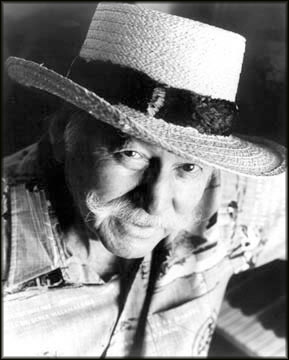
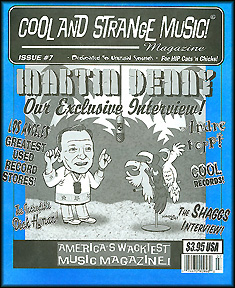
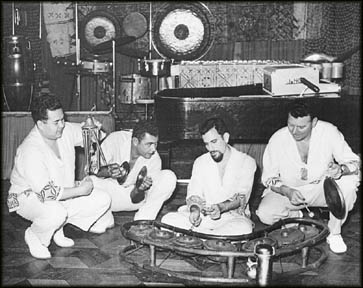
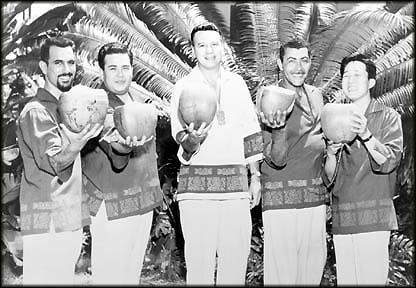
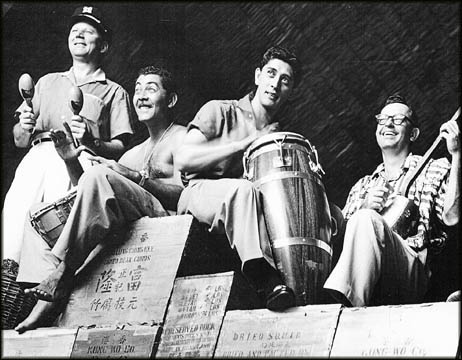
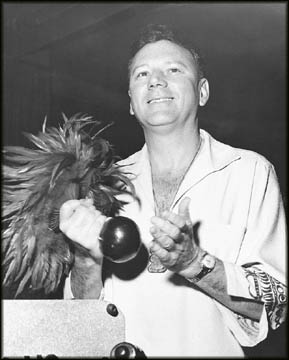
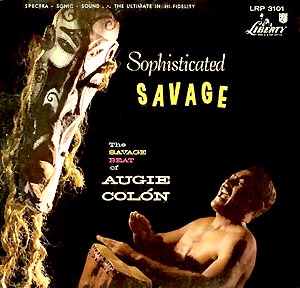
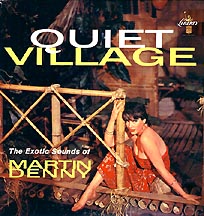
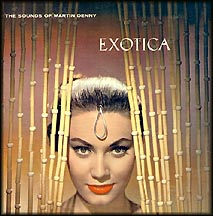
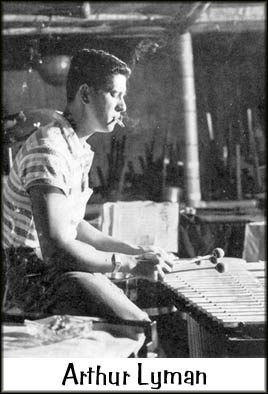
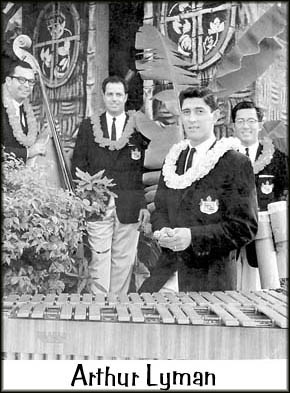
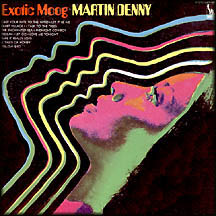
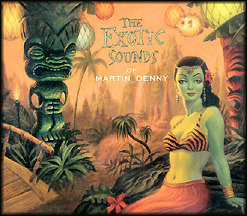
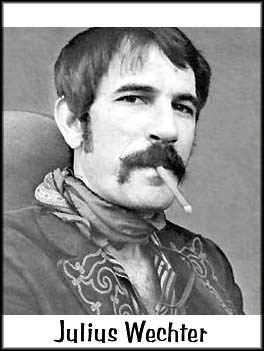
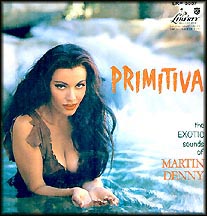
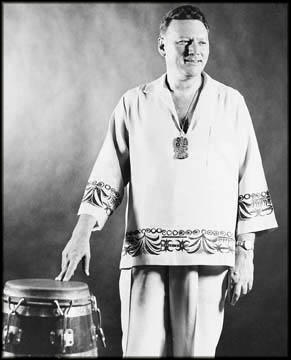
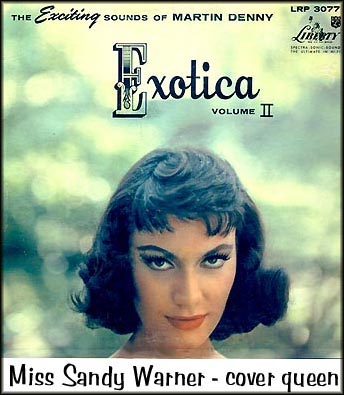
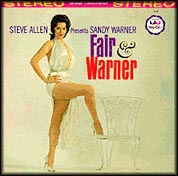 Then
she said "You and I have a lot in common." And I said
"Oh, really? What's that?" She said, "Well, I'm
the girl on your album covers!" I looked at her, and said
"My God, you're right!" (Laughs) But that's the one
and only time I ever met her.
Then
she said "You and I have a lot in common." And I said
"Oh, really? What's that?" She said, "Well, I'm
the girl on your album covers!" I looked at her, and said
"My God, you're right!" (Laughs) But that's the one
and only time I ever met her.